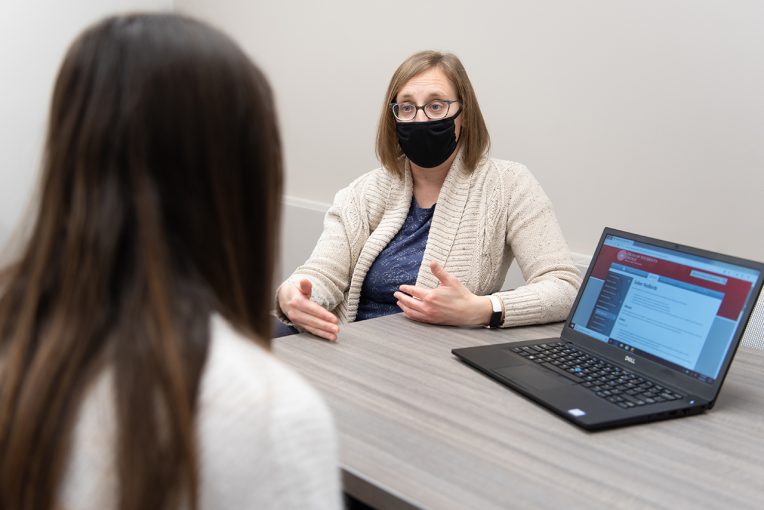Having to find all new friends is a terrifying thought. It’s even more terrifying if you’re in recovery.
Sober Redbirds can help. The registered student organization was formed three years ago to support those in recovery, or interested in recovery from alcohol and other addictions, including disordered eating, gambling, and impulsive activity.
David Trevino walked up to the Sober Redbirds table at Festival ISU in the fall of 2019, the semester he transferred to ISU.
“From then on, I was all in,” he said, adding he was new to the area and needed support to fill the gap from Alcoholics Anonymous meetings. “I found a lot of like-minded people who helped me succeed, and I made some great friends.”
When you need help, the thought of reaching out can be overwhelming, he said.
“The phone feels like it weighs a thousand pounds. We want everybody to know that we’re here and we’re more than happy to help in whatever you’re trying to recover from.”
In May, he’ll graduate with his degree in social work and will head to Florida to start his job in admissions in a treatment center.
Sober Redbirds also supports those who want to change their use of substances; it may not be full abstinence. It’s also for allies and those impacted by a family member or friend’s substance use or addiction. Jamie Laurson, an alcohol and drug interventionist in the Dean of Students Office, advises the group. Over the last year, she’s found more students reaching out as the pandemic created a rise in substance use and mental health issues.
“It’s not at all surprising we have higher participation this year,” she said.
Friday dinners, socials, and recovery meetings have been a staple of Sober Redbirds, and although members have been meeting virtually, in-person gatherings have resumed, following CDC guidelines.
“Being connected is so important,” Laurson said. “When people are wanting to make changes in using substances, they may have to give up their friend group, and it’s extremely overwhelming for students to say, ‘I’m not going to have anybody right now?’ It’s very daunting to do that all on your own. Sober Redbirds helps people feel more secure in moving in that direction. They can have some instant support.”
College students are in the highest risk category of any age group for developing a substance use disorder, but are the least likely to seek treatment, she said. The majority begin to develop a substance use disorder before they come to college, but the average age for going into recovery is 31, with the next decade cycling between recovery and returning to use. Starting recovery in college could give students decades of their life back, Laurson said.
She works to educate the campus on addiction and recovery, and has some advice for those who notice students missing class or work, turning assignments in late, or struggling with grades.
“Look further,” she said. “We are under treating substance use on campus. Ask what’s going on. Many students don’t even recognize they have a concern. They normalize it. It’s unrealistic to expect a young person with a substance use disorder to reach out and ask for help.”
To aid faculty/staff in recognizing when a student might need help, she offers Recovery Ally Training. The next session is 1 p.m. March 17, with training also available April 13 and May 14. The two-hour program includes information on how to recognize symptoms, make a referral, and use recovery friendly language.
Sober Redbirds meets at 7:30 p.m. Wednesdays on Zoom, in addition to weekly Friday gatherings. For more information, contact Laurson at jllaurs@IllinoisState.edu, or visit the Sober Redbirds Facebook page.

